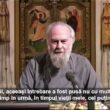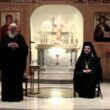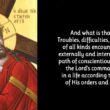It is obvious that most of the believers cannot attend daily the holy services from the Great Lent. They continue to go to the church on Sundays, but as we already know on the Sundays of the Great Lent the Holy Liturgy at least in its exterior aspects does not reflect the Lent and thus we can hardly feel the services of the Lent, the main means through which is transmitted to us the spirit of the Lent.
And since fasting is not reflected anymore in the culture we belong to, we don’t wonder anymore why today our way of understanding fasting is predominantly negative – talking about it as about a period when certain things like meat and fats, dances and entertainments are forbidden. The popular question – what are the things you give up for fasting? is an explicit expression of that common negative approach. In positive terms fasting is seen as the time when we have to make our annual duty to confess and commune (and this not later than the Palm Sunday as I read in a parish bulletin) Being accomplished this duty the rest of the fasting seems to lose all its positive meanings.
Thus it is obvious that here was developed a deep discrepancy between the spirit or the theory of fasting on one side thing which we tried to define on the base of the holy services from the Great Lent and on another side the popular way of understanding it which is often shared and supported not only by the laymen but also by the clergy. Because it is always easier to reduce something spiritual at something formal than to seek the spiritual side behind the formal aspect. We can say with exaggeration that although fasting is still kept it has lost much of its impact upon our life, it ceased to be our bath of repentance and renewal as it is considered by the liturgical and spiritual teaching of the Church.
But then can we rediscover it and turn it into a spiritual power in the daily reality of our life?
The answer at this question depends mainly and I would say exclusively on the fact whether we want or not to take fasting seriously. No matter how new and different are the conditions in which we are living today, no matter how real are the difficulties and obstacles raised by our modern world, none of these is an absolute obstacle, none of these makes fasting impossible. The origins of the gradual loss of the influence of fasting upon our lives are deeply rooted within us. The conscious or unconscious limitation of religion at a superfluous nominalism and symbolism is a way of avoiding or of figuring out the serious need for religion in our life, the need of religion for accomplishing duties and efforts. This limitation we must add is in a way specific for Orthodoxy.
The Western Christians, either Catholics or Protestants, when they face what they consider impossible they prefer t change the religion itself, they adapt it to new conditions and thus they make it more practical. For example I have recently seen how the Catholic Church reduces fasting at a minimum length then it removes it completely. We condemn with entitled indignation such an adaptation as a betrayal of the Christian tradition and as a stultification of the Christian faith.
And indeed it is the merit and the glory of Orthodoxy the fact that it does not adapt itself and doesn’t compromise itself with low standards that don’t make Christianity easy. It is for the glory of Orthodoxy and not for the glory of the Orthodox. We found not today or yesterday but long time ago a way to reconcile the exigencies for perfection of the Church with the human weaknesses and this not only without losing our reputation but with increased reasons for being self satisfied and having a clean conscience. The method consists in a symbolic accomplishment of these exigencies and the symbolic individualism penetrates today our entire religious life.
Thus for example we don’t even think to revise our cult and monastic rules – God forbids that! – and we continue to call an all night vigil a holy service of only an hour and we explain proudly that it is the same holy service the monks from the monastery of saint Sava celebrated in the 9th century. When we refer at fasting instead of the main questions – what is fasting? – we are satisfied with the symbolism of fasting.
In the church publications and bulletins they publish delicious recipes for fasting and a parish could even collect some extra money to popularize the delicious fasting meals. So many things are explained symbolically in our churches such as the interesting picturesque funny customs and traditions that represent something not much connecting us with God and the new life within Him but rather with the past and the customs of our ancestors therefore it becomes difficult to see behind this religious folklore the great importance of religion.
I’d like to emphasize the fact that these numerous customs don’t have anything wrong in themselves. When they appeared they meant the means and expressions of a society that took religion seriously. Those were not symbols but life. What happened was that as life changed upon the whole and became less influenced by religion, some customs survived as symbols of a way of life that doesn’t exist anymore. And it survived what was more picturesque and less difficult. Here the spiritual danger is that gradually some people begin to understand religion as a system of symbols and customs instead of perceiving these as a call to spiritual renewal and struggle.
There is more toil and money spent on preparing fasting dishes or the Easter baskets than on fasting and taking part at the spiritual reality of Easter. This means that as long as the customs and traditions are not linked with the general religious view upon the world which created them in fact, the symbols are not taken seriously and the Church will remain estranged of life and has no power over it. Instead of representing symbolically our rich tradition we should start bringing this into our real life.
Then to take fasting seriously means to consider it first of all at the deepest level possible as a spiritual question in need for an answer, a decision, a plan, a continuous effort.
For this reason as we know it the weeks dedicated to the preparation for fasting were settled by the Church. This is the time of answers, of determination and of planning. And the best and easiest way is to follow the guidance of the Church – by meditating upon the five evangelical themes offered to us on the five Sundays of the period before the Lent: that of desire (Zacchaeus) of humbleness (the publican and the pharisee) of the return from exile (the prodigal son), of the judgment (The frightening judgment) and of the forgiveness (Adam’s expulsion from heaven).
These periscopes are not made only for being listened in the church. The idea is that they should be taken home to meditate upon them in the light of our own life, of our family situation, professional duties, preoccupations for material things, of our relationships with the fellow men beside us. If at this meditation is added the prayer of this period before Lent, `open the doors of repentance for me Life Giver` and psalm 137 – at the Babylon river…- we begin to understand what means to feel with the Church how a liturgical period revives a daily life.
Its is also the right time to read a religious book. The aim of this reading is not only to enrich our religious knowledge but first of all to purify our mind of everything fills it as a habit. It is incredible how crowded is our mind with all kinds of worries and interests, concerns and feelings and how little we can control this agglomeration.
By reading a religious book, by focusing our attention upon something quite different of the habitual content of our mind it is created a different mental and spiritual atmosphere. These are not recipes, there can be other ways of preparing ourselves for fasting.
What is important during this period before fasting is to regard it as if it were far and would get close to us or probably as if it were something sent to us by the Lord Jesus Christ as a chance for a change, for renewal and deepening and if we take seriously this future chance on the Sunday of Adam’s expulsion from heaven (of Forgiveness) when we leave our homes for Vespers we should be ready to assume even partially the words of the great prokeimenon that opens the Great Lent:
`Do not turn Your face from your servant; when I am in trouble hear me quickly…`
Source: Alexander Schmemann – Postul Mare








